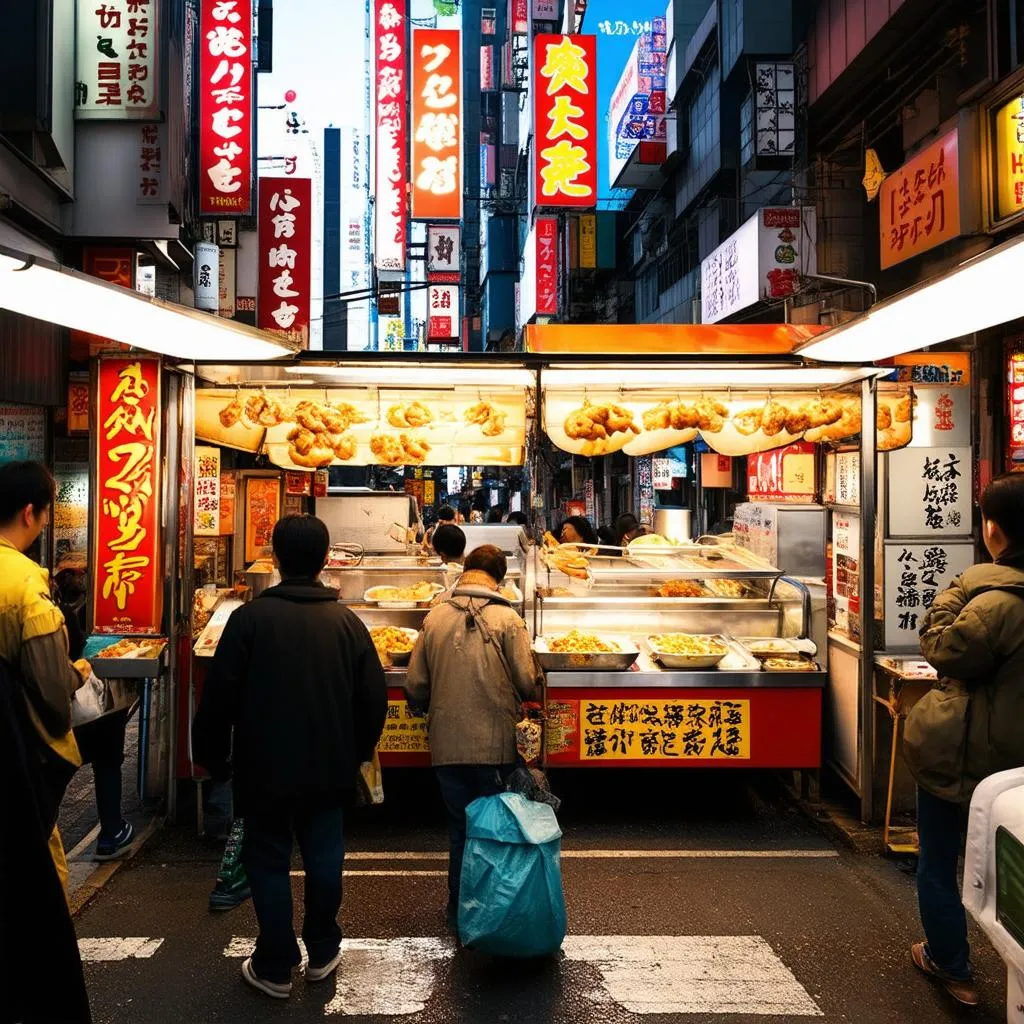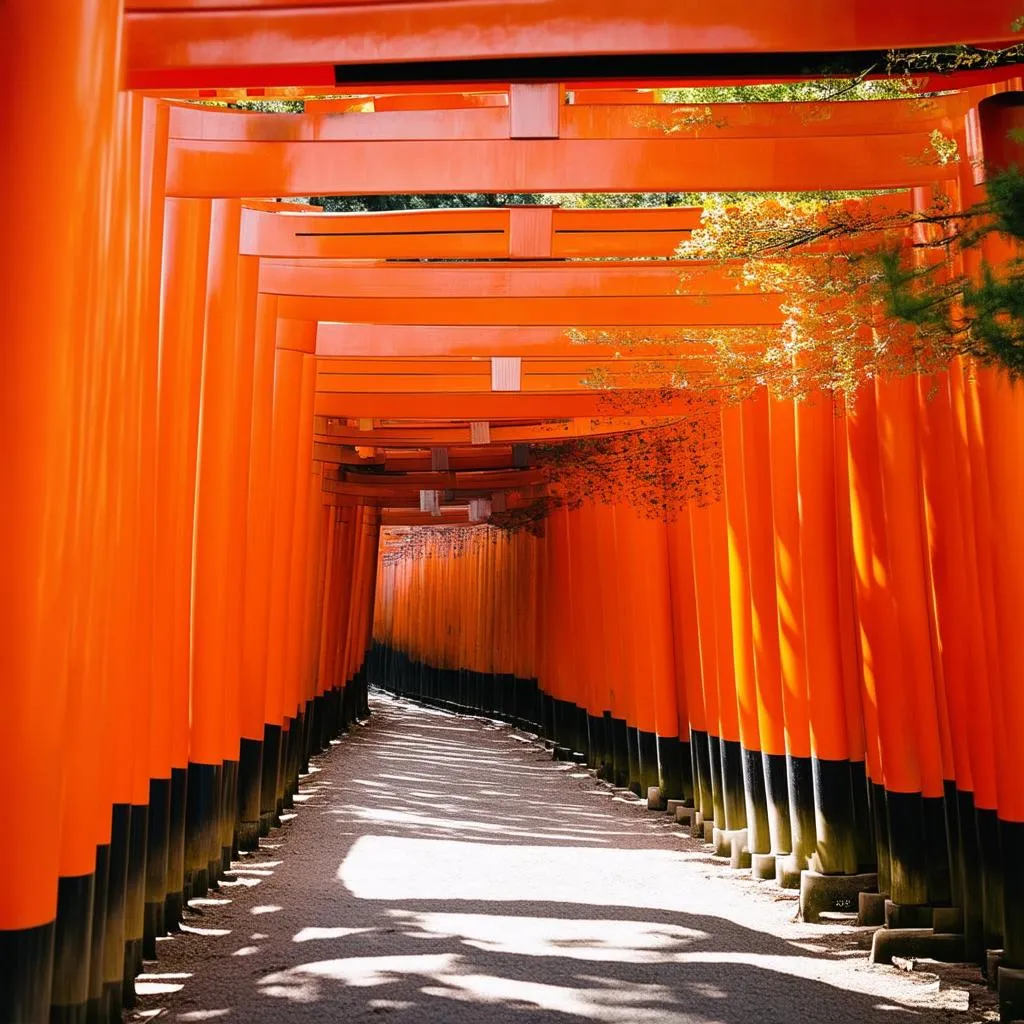“The journey of a thousand miles begins with a single step,” wrote the ancient Chinese philosopher Lao Tzu. And while a trip to Japan might not literally be a thousand miles, it’s a journey many dream of, filled with enchanting culture, breathtaking landscapes, and delicious cuisine. But before you pack your bags and book that flight, one question looms large: How Much Is It To Travel To Japan?
Unraveling the Costs: A Realistic Look at Your Japan Budget
Like any trip, the cost of traveling to Japan varies greatly depending on your travel style. Are you a backpacker looking for budget-friendly adventures, or do you prefer luxurious ryokans and first-class travel? Are you a foodie eager to splurge on Michelin-starred meals, or are you happy exploring local markets and street food stalls?
To give you a ballpark figure, a comfortable trip for two weeks in Japan can cost anywhere between $2,500 to $5,000 per person, excluding airfare.
But don’t let this number deter you! By breaking down the costs and understanding the different factors involved, you can plan a trip to Japan that fits your budget and travel style.
Breaking Down the Expenses: What to Expect
Here’s a detailed breakdown of the main expenses you’ll encounter when traveling to Japan:
1. Flights: Your Gateway to the Land of the Rising Sun
Round-trip flights to Japan from the US can range from $700 to $1,500 or more, depending on the time of year, airline, and class of travel. Peak seasons like spring (cherry blossom season) and autumn (fall foliage) tend to be more expensive. Booking in advance and being flexible with your travel dates can help you snag better deals.
2. Accommodation: From Capsule Hotels to Traditional Ryokans
Japan offers a wide range of accommodation options to suit every budget:
- Budget: Hostels and capsule hotels offer the most affordable options, starting from $20 per night.
- Mid-range: Business hotels and guesthouses provide comfort and convenience, with prices ranging from $60 to $150 per night.
- Luxury: For a truly immersive experience, splurge on a stay at a traditional ryokan (Japanese inn) or a luxury hotel, costing upwards of $200 per night.
Tip: Consider staying in different neighborhoods to experience various aspects of Japanese city life. For instance, Shinjuku in Tokyo offers vibrant nightlife, while Asakusa provides a glimpse into the city’s historical side.
3. Food: A Culinary Journey Through Japanese Flavors
Expect to spend around $30 to $50 per day on food in Japan. From Michelin-starred restaurants to humble ramen shops, Japan’s culinary scene is a feast for the senses.
- Budget: Enjoy affordable meals at local eateries, street food stalls, and convenience stores.
- Mid-range: Indulge in delicious sushi sets, tempura, and ramen at mid-range restaurants.
- Luxury: Treat yourself to a kaiseki (traditional multi-course meal) experience or dine at a Michelin-starred restaurant.
Don’t miss out on trying local specialties like okonomiyaki in Osaka, miso katsu in Nagoya, and fresh seafood at Tokyo’s Tsukiji Fish Market.
4. Transportation: Navigating Japan’s Efficient Network
Japan boasts an incredibly efficient and extensive public transportation system:
- Japan Rail Pass: If you plan on traveling extensively by train, the Japan Rail Pass offers unlimited travel on most JR lines for a set period.
- Suica/Pasmo Cards: These rechargeable cards offer convenient access to subways, buses, and even some vending machines.
- Local Trains and Subways: Efficient and affordable, local trains and subways are the most convenient way to get around cities.
Budget around $20 to $30 per day for transportation, depending on your itinerary.
5. Activities and Attractions: Exploring Japan’s Rich Culture
From ancient temples to futuristic museums, Japan offers a plethora of activities and attractions:
- Temples and Shrines: Many temples and shrines, such as the iconic Fushimi Inari Shrine in Kyoto, offer free admission.
- Museums: Entrance fees for museums vary, but many offer discounted entry on certain days.
- Theme Parks: For a fun-filled day, visit theme parks like Tokyo Disneyland or Universal Studios Japan.
Allocate around $30 to $50 per day for activities, depending on your interests.
Planning Your Dream Trip: Tips for Every Budget
Budget Travelers:
- Travel during the off-season: Avoid peak seasons to save on flights and accommodation.
- Stay in hostels or capsule hotels: These budget-friendly options offer clean and basic accommodation.
- Utilize free activities: Explore parks, temples, shrines, and local markets.
- Cook some meals: Take advantage of grocery stores and convenience stores for affordable meals.
Mid-Range Travelers:
- Consider a Japan Rail Pass: If you plan on extensive train travel, a JR Pass can save you money.
- Stay in business hotels or guesthouses: These options offer comfort and convenience at reasonable prices.
- Dine at a mix of restaurants: Enjoy local eateries, mid-range restaurants, and occasional splurges.
- Book activities and attractions in advance: Secure discounts and avoid queues.
Luxury Travelers:
- Splurge on a traditional ryokan: Experience the epitome of Japanese hospitality and indulge in onsen (hot spring) baths.
- Dine at Michelin-starred restaurants: Treat your taste buds to unforgettable culinary experiences.
- Hire a private guide: Gain deeper insights into Japanese culture and history.
- Enjoy exclusive experiences: Attend tea ceremonies, take calligraphy classes, or witness a sumo wrestling match.
Feng Shui Tips for a Harmonious Journey:
In the spirit of Feng Shui, aligning your travel plans with positive energy can enhance your experience. Consider incorporating these tips:
- Choose auspicious travel dates: Consult a Feng Shui calendar for dates that promote smooth journeys and good fortune.
- Pack meaningful items: Carry lucky charms or talismans that resonate with you.
- Be mindful of your surroundings: Respect local customs and traditions, and maintain a positive and respectful demeanor.
Frequently Asked Questions:
Q: What is the best time to visit Japan?
A: Japan offers something special year-round. Spring (March-May) boasts cherry blossoms, autumn (September-November) showcases vibrant foliage, summer (June-August) is perfect for festivals, and winter (December-February) offers snowy landscapes and winter sports.
Q: How much money should I bring to Japan?
A: It’s advisable to have a mix of cash and credit cards. Carry around $50 to $100 per day for smaller expenses, and use credit cards for larger purchases.
Q: Do I need to know Japanese to travel in Japan?
A: While English is not widely spoken, especially outside major cities, many signs and announcements are available in English. Learning basic Japanese phrases can greatly enhance your experience.
Travelcar.edu.vn: Your Gateway to Japan’s Wonders
Planning a trip to Japan can be overwhelming, but it doesn’t have to be. Let Travelcar.edu.vn be your trusted guide. Our website offers a wealth of information on destinations, itineraries, and travel tips to help you plan your dream trip. From the bustling streets of Tokyo to the ancient temples of Kyoto, discover the magic of Japan with us.
Explore our website for more insights and inspiration for your upcoming Japanese adventure!
Conclusion:
Traveling to Japan is an unforgettable experience that will leave you with lasting memories. By understanding the costs, planning carefully, and embracing the local culture, you can create a trip that aligns with your budget and travel aspirations. So, pack your bags, book your flights, and embark on an incredible journey to the Land of the Rising Sun!
 Japan Travel Budget
Japan Travel Budget
 Tokyo Street Food
Tokyo Street Food
 Fushimi Inari Shrine, Kyoto
Fushimi Inari Shrine, Kyoto